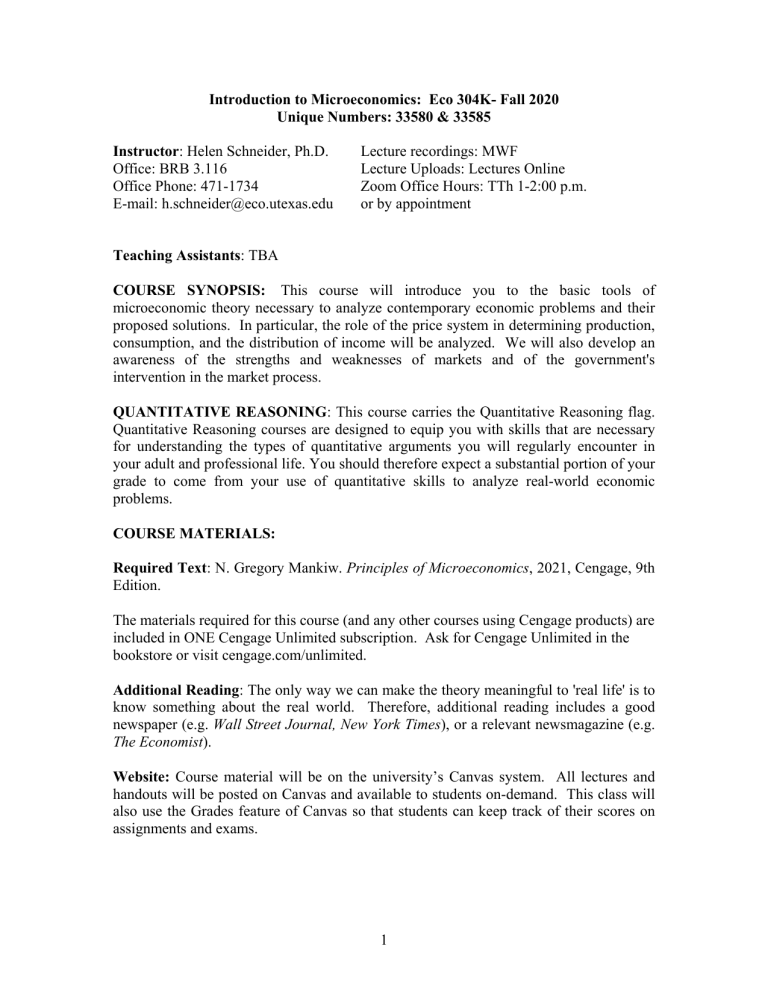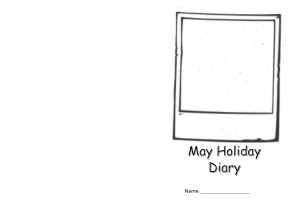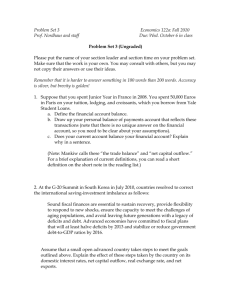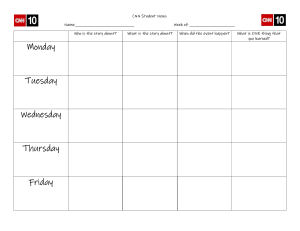
Introduction to Microeconomics: Eco 304K- Fall 2020 Unique Numbers: 33580 & 33585 Instructor: Helen Schneider, Ph.D. Office: BRB 3.116 Office Phone: 471-1734 E-mail: h.schneider@eco.utexas.edu Lecture recordings: MWF Lecture Uploads: Lectures Online Zoom Office Hours: TTh 1-2:00 p.m. or by appointment Teaching Assistants: TBA COURSE SYNOPSIS: This course will introduce you to the basic tools of microeconomic theory necessary to analyze contemporary economic problems and their proposed solutions. In particular, the role of the price system in determining production, consumption, and the distribution of income will be analyzed. We will also develop an awareness of the strengths and weaknesses of markets and of the government's intervention in the market process. QUANTITATIVE REASONING: This course carries the Quantitative Reasoning flag. Quantitative Reasoning courses are designed to equip you with skills that are necessary for understanding the types of quantitative arguments you will regularly encounter in your adult and professional life. You should therefore expect a substantial portion of your grade to come from your use of quantitative skills to analyze real-world economic problems. COURSE MATERIALS: Required Text: N. Gregory Mankiw. Principles of Microeconomics, 2021, Cengage, 9th Edition. The materials required for this course (and any other courses using Cengage products) are included in ONE Cengage Unlimited subscription. Ask for Cengage Unlimited in the bookstore or visit cengage.com/unlimited. Additional Reading: The only way we can make the theory meaningful to 'real life' is to know something about the real world. Therefore, additional reading includes a good newspaper (e.g. Wall Street Journal, New York Times), or a relevant newsmagazine (e.g. The Economist). Website: Course material will be on the university’s Canvas system. All lectures and handouts will be posted on Canvas and available to students on-demand. This class will also use the Grades feature of Canvas so that students can keep track of their scores on assignments and exams. 1 POLICY ON STUDENTS WITH DISABILITIES The University of Texas at Austin provides upon receipt appropriate academic adjustments for qualified students with disabilities. For more information, contact the Office of the Dean of Students—Services for Students with Disabilities, 471-6259. SCHOLASTIC DISHONESTY POLICY Students who violate University rules on scholastic dishonesty are subject to disciplinary penalties, including the possibility of failure in the course and/or dismissal from the University. Since such dishonesty harms the individual, all students, and the integrity of the University, policies on scholastic dishonesty will be strictly enforced. COURSE REQUIREMENTS: Tests. There will be two midterm tests during the semester and a comprehensive final examination. There will be no make-ups for the midterm exams. Should dire circumstances (e.g. illness) prevent you from taking a test, its weight will be added to your final exam. Homework. Thirteen out of fourteen problem sets will count towards your final grade. For each of the chapters covered there will be a number of questions that you will answer in the Aplia homework program available in Mindtap. For each question you can have up to 3 attempts and you will receive the average for the attempts you make. Grading: Aplia Homework = 15%; Midterm Exams = 25% each; Final = 35%. If you believe that your exam was incorrectly graded, you may request a re-grade. Note that the entire test will be re-graded, and may result in a lower grade. You have 2 weeks from the date that the exam is handed back in order to submit your request. A letter grade will be assigned based on your weighted course average score and your performance relative to the rest of the class. Letter grades include A, A-, B+, ... , D, D-, F. COVID Caveats: To help keep everyone at UT and in our community safe, it is critical that students report COVID-19 symptoms and testing, regardless of test results, to University Health Services, and faculty and staff report to the HealthPoint Occupational Health Program (OHP) as soon as possible. Please see this link to understand what needs to be reported. 2 READINGS AND COURSE OUTLINE This is only a suggested outline and is subject to change, unlike the exam dates, which are fixed. Topic Wednesday, August 26 Introductions and Syllabus Mankiw - Chapter 1. Ten Principles of Economics Friday, August 28 Mankiw - Chapter 2. Appendix. Algebra Review (pp. 37-45) Monday, August 31 Mankiw - Chapter 4. The Market Forces of Supply and Demand Wednesday, September 2 Mankiw - Chapter 5. Elasticity of Supply and Demand Friday, September 4 Recitation: Supply and Demand; Elasticity Monday, September 7 LABOR DAY HOLIDAY Wednesday, September 9 Mankiw - Chapter 6. Supply, Demand, and Government Policies Friday, September 11 Recitation: Elasticity, Government Policies Monday, September 14 Mankiw - Chapter 21. The Theory of Consumer Choice Wednesday, September 16 Mankiw - Chapter 21. The Theory of Consumer Choice Friday, September 18 Recitation: The Theory of Consumer Choice Monday, September 21 Mankiw - Chapter 7. Consumers, Producers and the Efficiency of Markets Wednesday, September 23 Mankiw - Chapter 8. Application: The Costs of Taxation Friday, September 25 Exam I review Monday, September 28 Exam 1 Wednesday, September 30 Mankiw - Chapter 10. Externalities Friday, October 2 Catch-up and review Monday, October 5 Recitation: Externalities Mankiw - Chapter 11. Public Goods and Common Resources Wednesday, October 7 Mankiw - Chapter 13. The Costs of Production (short-run) Friday, October 9 Recitation: Public Goods and the Costs of Production Monday, October 12 Mankiw - Chapter 13. The Costs of Production (long--run) Wednesday, October 14 Mankiw - Chapter 14. Competitive Markets Friday, October 16 Recitation: Costs of Production and Perfect Competition Monday, October 19 Mankiw - Chapter 14. Competitive Markets Wednesday, October 21 Mankiw - Chapter 15. Monopoly Friday, October 23 Recitation: Competitive Markets and Monopoly Monday, October 26 Mankiw. Chapter 15. Antitrust Wednesday, October 28 Mankiw - Chapter 16. Monopolistically Competitive Markets Friday, October 30 Exam 2 Review Monday, November 2 Exam 2 Wednesday, November 4 Mankiw - Chapter 17. Oligopoly Friday, November 6 Recitation: Oligopoly Monday, November 9 Mankiw - Chapter 18. Markets for the Factors of Production: Labor 361374 Wednesday, November 11 Mankiw-Chapter 19. Earning and Discrimination Friday, November 13 Recitation: Labor Markets Monday, November 16 PPF (Chapter 2, p. 24-27) Mankiw-Chapter 3. Interdependence and the Gains from Trade Wednesday, November 18 Mankiw-Chapter 3. Interdependence and the Gains from Trade Friday, November 20 Recitation: International Trade Monday, November 23 Mankiw-Chapter 9. International Trade Wednesday, November 25 THANKSGIVING HOLIDAY 3 Friday, November 27 Monday, November 30 Wednesday, December 2 Friday, December 4 Monday, December 7 THANKSGIVING HOLIDAY Mankiw-Chapter 20. Income Inequality and Poverty Mankiw-Chapter 12. Design of the Tax System Review Review ***Final Exam*** 4



